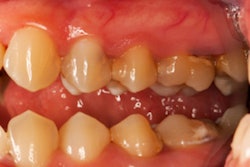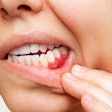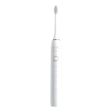
Using ornidazole in conjunction with scaling and root planing achieves significantly better clinical results in treating moderate to advanced chronic periodontitis than periodontal treatment alone, according to a new study in the Journal of Periodontology (January 5, 2012).
Antibiotics such as lincosamides (clindamycin), macrolides (spiramycin, clarithromycin), penicillins (amoxicillin with clavulanic acid), and tetracyclines (doxycycline) have been used in the past as effective adjuncts for treating various forms of periodontitis, according to the researchers, from the Government Dental College and Research Institute in Bangalore, India.
Metronidazole, an antimicrobial agent belonging to the 5-nitroimidazole group, alone or combined with amoxicillin has been used successfully in treating chronic periodontitis. Ornidazole is another antibiotic that belongs to the 5-nitroimidazole group with comparable or better antibacterial properties, according to the study authors.
They wanted to evaluate ornidazole because of the known efficacy of metronidazole in treating various forms of periodontitis, according to lead author A.R. Pradeep, MDS, a professor and the head of the periodontics department at the Government Dental College and Research Institute. Ornidazole has a longer half-life and a better pharmacokinetic profile than metronidazole, Dr. Pradeep noted in an interview with DrBicuspid.com.
"It has been tried once systemically in early-onset periodontitis, where it showed good results," he said. "We wanted to now explore its benefits in the most common form of periodontitis: chronic periodontitis. We tried to test a drug that hasn't been used earlier as an adjunct in the treatment of chronic periodontitis."
6-month review
The researchers looked at 58 patients between the ages of 25 and 60 with untreated moderate to advanced periodontitis who had at least 12 teeth in which the probing depth was 4 mm or more and who showed radiographic evidence of bone loss. The subjects were selected from patients referred to the periodontics department at the Government Dental College and Research Institute between November 2010 and July 2011.
Each patient's medical, periodontal, dental, and smoking histories were obtained. Exclusion criteria included the following:
— A.R. Pradeep, MDS
- Pregnancy or lactation
- Smokers
- Systemic diseases, such as diabetes
- Systemic antibiotics taken within the previous two months
- Use of nonsteroidal anti-inflammatory drugs
- Confirmed or suspected intolerance to 5-nitroimidazole derivatives
- Subgingival scaling and root planing or surgical periodontal therapy in the previous year
The patients were instructed on strict oral hygiene measures and advised to use 0.2% chlorhexidine mouthwash for a week.
They were then divided into two groups: 30 subjects were assigned to full-mouth scaling and root planing plus placebo for the control group, and 28 assigned to full-mouth scaling and root planing plus ornidazole for the test group. Subjects in the test group received 500 mg of ornidazole to be taken twice daily for seven days.
All the subjects in both groups were recalled at one week, one month, three months, and six months. Researchers recorded clinical parameters that included plaque index, gingival index, clinical attachment level, and probing depth.
Additional benefits
The researchers analyzed data from 50 subjects (31 females, 19 males). At six months, the test group resulted in a greater mean reduction in probing depth (2.84 mm) compared with the control group (0.84 mm) and also a greater mean clinical attachment level reduction (2.92 mm) compared with the control group (0.92 mm).
"The results obtained in this study are in accordance with many other previous studies," Dr. Pradeep said. "Systemic use of ornidazole did provide additional benefits over and above nonsurgical therapy alone."
Dentists primarily rely on a combination of amoxycillin and metronidazole for most periodontal infectious diseases, he added.
"Although there's no questioning the efficacy of this, this trial opens a newer option and avenue for dentists with regard to their judicious prescription of systemic drugs for chronic periodontitis," he said.
The addition of antimicrobial agents to thorough mechanical treatment could reduce the need for further treatment, dramatically reduce treatment costs, and defend the "judicial and restrictive adjunctive use" of systemic antimicrobials, the study authors concluded.



















